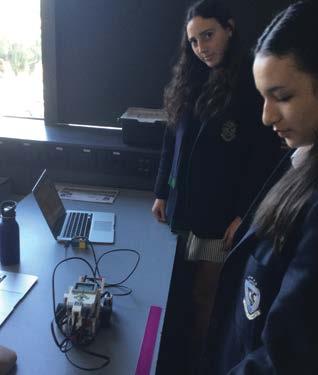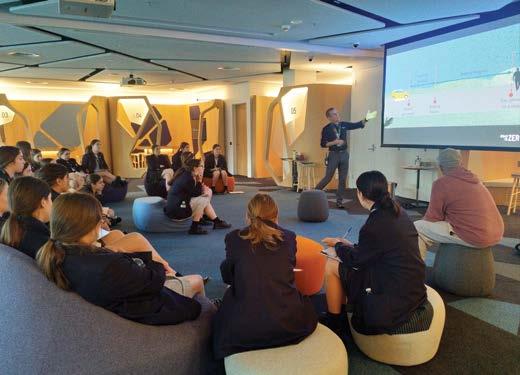
4 minute read
The future is STEAM
To develop a complete mind: Study the science of art; Study the art of science. Learn how to see. Realize that everything connects to everything else.
LEONARDO DA VINCI





Da Vinci’s words are apt. We are in the midst of great industrial change; the students of today are preparing for careers and jobs that don’t yet exist. How do we support the next generation for work that we can’t see?
STEAM (Science, Technology, Engineering, Arts and Maths) is a pedagogy that uses interdisciplinary learning areas to help students develop necessary cognitive skills such as creativity, critical thinking, decision making, and complex information processing. These skills are the foundation for an unknown future, where innovation and problem solving will lead the way. Building works at the College, over the coming years will reflect this interdisciplinary methodology, while providing spaces for the development of subject-specific knowledge and skills.
HOW IS STEAM IMPLEMENTED AT ST COLUMBA’S COLLEGE?
St Columba’s College recognises the growing need for STEAM, and offers a variety of learning programs, co-curricular activities and partnerships, to support the learning and development of students and staff.
SUBJECT BASED OFFERINGS The College offers many opportunities for students to study subjects from the STEAM disciplines as well as providing links to the field through other learning areas. At Year 7, Design Code Create students explore digital citizenship and study how computers communicate through data encoding and binary systems. Critical and logical thinking skills are enhanced through various activities in order to prepare students for the coding component of the subject. These skills can be transferred across subjects, such as Mathematics where coding is part of the curriculum.
Our Year 8 students study the interdisciplinary subject of Fiontar. Fiontar makes use of STEAM practices and pedagogy through various learning tasks centred on the three topics of Sustainability, Melbourne and STEAM. Their learning is scaffolded with the design thinking process and focuses on real life application, as well as the development of future focussed skills. The College STEAM lab is a highly resourced centre with a laser cutter, 3D printers, workshop tools and recycled materials so that students can make physical prototypes of their work. Students also have access to drones, Jimu and EV3 robots, and stand-alone virtual reality goggles which promote an active learning experience.
STEAM is offered as an elective for students in Years 9 and 10. Concepts from design thinking are further explored by studying the role it plays in structuring and promoting good innovation. Students discuss the key skills and mindsets of designers and innovators and study how these dispositions can be applied to real life problems and design. Concepts such as wearable technology, drones, Rube Goldberg machines and Aviation are taught at these year levels.
CO-CURRICULAR PROGRAMS The College offers many STEAM programs outside of the usual curriculum, such as Make it Monday, where students spend lunch times in the STEAM lab interacting with various resources to make products using the laser cutter and 3D printers. The STEAM lab has also supported the work of the Environment Captain this year implementing the design thinking process for the creation of the College’s vegetable garden design competition. While the Birdman Rally failed to run due to Covid this year, students were given the opportunity to participate in the Victorian Solar Car Challenge. Students participating in this attended weekly online meetings throughout term three and four and were guided through the construction of a model solar car. PARTNERSHIPS The College has developed strong partnerships with various organisations to further enhance STEAM learning at the school. Currently the school is participating in the STEM Professional in Schools program which is supported by the Australian Government Department of Education, Skills and Employment and is delivered by the CSIRO. Mechanical Engineer, Ms Kelsey Rowe, has been matched to the College and has worked to increase the development of STEM skills, knowledge and confidence with both teachers and students. The partnership has continued during remote learning where she has been assisting students with the Victorian Model Solar Car Challenge.
Amazon Web Services (AWS) is another College partner, who has assisted Year 10 PBL students, since 2019. Planning is currently underway to extend this partnership to other year levels in 2022. The aim of this project is to integrate hands-on learning with support from AWS into the Year 7, 8 and 9 curriculum to help students develop coding and cloud-based skills. During term four, the implementation of the Precious Plastics Program in collaboration with Monash University will begin. The College has recently purchased a plastic granulator, sheet press and plastic former to embark on this exciting program. The machines will broaden the scope of the curriculum and will allow for the creation of more interdisciplinary learning opportunities for students across learning areas, in the Arts, Science, Technology, Humanities, Fiontar as well as the Environment Group. The Precious Plastics Program will support the curriculum in sustainable education, raise awareness and allow for implementation of more sustainable practices across the College.
To ensure teachers are at the forefront of innovation in STEAM education, the College is working in partnership with MACS, Monash University, Brisbane Catholic Education and the University of Queensland on the ARC (Australian Research Council) Linkage Project. Participation in the project on ProblemBased Learning (PBL) will be the driving paradigm for multi-disciplinary STEAM learning at the College and involves staff across learning areas. There are three phases of action associated with this project which will span across 2021 - 2023. Phase one (2021) involves the development of an initial framework for PBL in educational practice.







